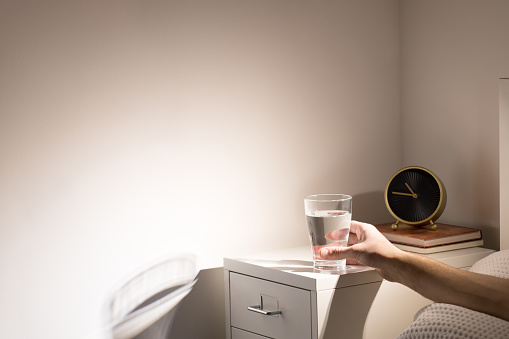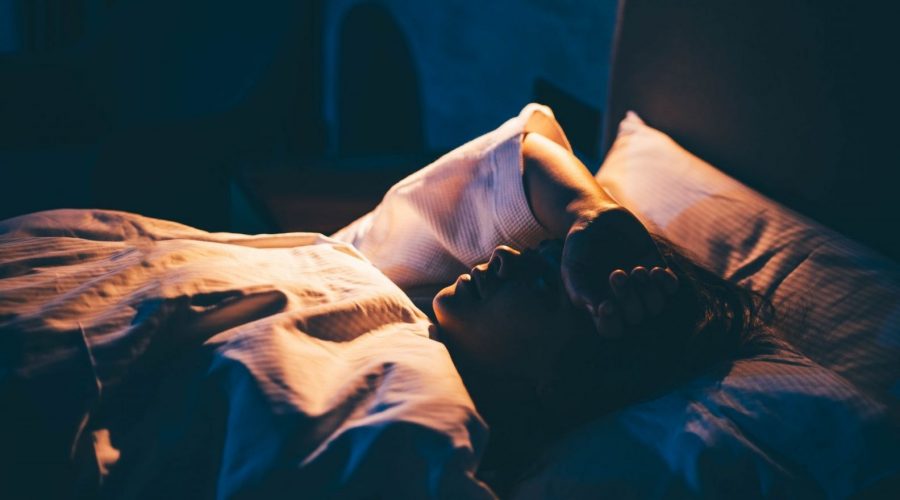“Why do I keep waking up at the same time every night to pee?”
Do you keep waking up with a full bladder and realising that it’s only 3am? Here’s why that happens – and what to do about it.
Another day, another morning waking up before my alarm because I have to pee. I debate trying to sleep through it – I probably won’t be able to fall back asleep if I get up – but the last thing I need is a urinary problem from waiting too long. Reluctantly, I get up, wondering why I wake up at the same time almost every (early) morning to pee and if this will keep happening.
If you’ve experienced this too, we’re not alone: Reddit is inundated with people asking the same question. So, I turned to urology experts to ask why this occurs. They shared a couple of possible reasons.
Your bladder is on a schedule and full
“A person’s routine will often create a designated voiding schedule,” says Dr Russel Williams, founder, CEO and CMO of The Y Factor, a urological wellness and fertility clinic. He shares an example: imagine that your bladder gives you the heads up every five hours or so. “The kidneys create a volume of urine such that the bladder needs to empty over a consistent five-hour delay.”
Your bladder gets increasingly full and only tells you to go to the bathroom when it hits a certain point. “The bladder is triggered to alert the individual when it reaches a capacity between 300 and 400 millilitres,” Dr Williams adds. “That alert is often strong enough to wake a person from sleep.” Perhaps the time that you wake up – for me, it’s around 4am – is when your bladder typically hits that point due to when and how much you drink.
You’re experiencing nocturia
Nocturia is a condition that causes an urge to pee that you can’t ignore at night. “For those suffering with this condition, these night-time wake-up calls may be once a night or more,” says Dr Adam Ramin, a urologic surgeon and medical director of Urology Cancer Specialists.
Once a night is normal for people 45 years or older, he says, but if it’s more than that (or you’re younger), you might want to hit up your doc. “The more times a night a person gets up to void their bladder, the more severe the nocturia is considered to be.”
Some other signs of nocturia include peeing more (volume-wise), fatigue and sleepiness.
How to prevent those early morning trips to the bathroom
If you’re tired of not getting enough sleep because your bladder is serving as your too-early alarm clock, then try one of these potential fixes:
Change your drinking habits
The urge to drink something at night is real – whether it’s to quench your thirst or take the edge off – but drinking too late doesn’t help. “Decrease fluid intake and decrease natural diuretics like coffee, tea and alcohol,” Dr Williams says. He explains this may help you to produce urine at a slower rate and may help your bladder “hold out” until morning.
Your best bet is to stop drinking two hours before bed, or at least sip on less than a glass of water in-between that two-hour mark and turning off your bedroom light.

Practice kegel exercises
Kegels can also strengthen your pelvic floor and prevent, well, peeing your pants. “Tighten the muscles around the urethra and hold for five seconds,” Dr Ramin suggests. “Perform this exercise at least 20 times a day. Doing so will help with symptoms of [an] overactive bladder or bladder irritation and help prevent incontinence in the future.”
Talk to a doctor about medication
Dr Williams recommends taking medicine that can help with an overactive bladder. Talk to your doctor about the medication that’s best for you.
“Medications that specifically target not the bladder but the pelvic floor can also decrease the need for unplanned night-time voiding,” he adds.
How bad is it to just ‘hold it’?
Waiting until your actual alarm goes off is tempting, but not a good idea for your health, especially if you do this consistently. “If one is repetitively effective in suppressing bladder urges, then you can get an over-distended bladder that then will not empty very well,” Dr Williams says. “Overfilling the bladder but not completely emptying it… leads to a higher risk of urine and kidney infection.”
You don’t necessarily have to go that second, but go ASAP. “Once you have the urge to go, try to get to the bathroom within half [an] hour,” Dr Ramin says. “Holding urine too long will damage the bladder muscle and mucosa, eventually leading to incontinence, infection or poor bladder emptying.” In fact, Dr Ramin believes one of the worst things we can do for our bladder health is “holding it” for too long.
“Engaging in the best bladder health practices might take some getting used to at first,” he says. “But I can guarantee that the effort is worth it.”
Images: Getty
Source: Read Full Article
